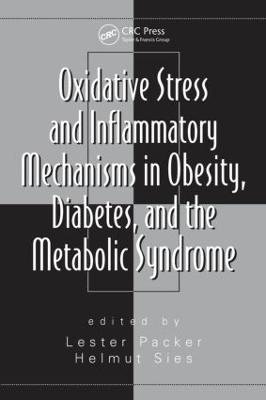
Oxidative Stress and Inflammatory Mechanisms in Obesity, Diabetes, and the Metabolic Syndrome
Crc Press Inc (Verlag)
978-1-4200-4378-5 (ISBN)
Characterized by obesity, insulin resistance, dyslipidemia, and hypertension, metabolic syndrome is associated with the risks of type 2 diabetes mellitus and cardiovascular disease. Obesity, which increases the incidence of atherosclerotic cardiovascular disease and subsequently leads to increased stress and inflammation, appears to play a central role in the progression of the syndrome. Evidence of inflammatory processes in accumulated fat appears to be an early initiator of metabolic syndrome. Likewise, the more active angiotensin system in obesity may contribute to even greater oxidative stress that serves as a key signaling event in vascular remodeling. These factors strengthen obesity's association with oxidative stress.
Oxidative Stress and Inflammatory Mechanisms in Obesity, Diabetes, and the Metabolic Syndrome is designed to encourage the development of evidence-based nutritional and pharmacological therapies that can attenuate the impact of obesity-induced insulin resistance and ensuing metabolic syndrome. The book offers a deep understanding of the molecular mechanisms that underlie the process. Edited by leading authorities on oxidative stress, the book's chapters report on cutting-edge research that explores intracellular events mediating or preventing oxidative stress and pro-inflammatory processes in obesity and type 2 diabetes. It also brings together research on the molecular mechanisms inherent in the progression of metabolic stress, includes phenotypic perspectives, and discusses dietary factors, including the role of micronutrients.
The chapter authors, each a leading expert in his or her field, discuss different components of metabolic stress and obesity and their associations with oxidative stress and inflammation. The book fills a unique role as a base of knowledge for researchers seeking to develop nutritional and or pharmacological therapies, as well as clinicians seeking a better understanding of this increasingly common dis
Lester Packer, Helmut Sies
The Metabolic Syndrome Defined. The Metabolic Syndrome: The Question of Balance between the Pro-Inflammatory Effect of Macronutrients and the Anti-Inflammatory Effect of Insulin. The Role of Oxidative Stress in Diseases Associated with Overweight and Obesity. Metabolic Syndrome Due to Early Life Nutritional Modifications. Oxidative Stress and Antioxidants in Perinatal Period. Maternal Obesity, Glucose Intolerance, and Inflammation in Pregnancy. Obesity, Nutrigenomics, Metabolic Syndrome, and Type 2 Diabetes. Post-Prandial Endothelial Dysfunction, Oxidative Stress, and Inflammation in Type 2 Diabetes. Obesity and Inflammation: Implications for Atherosclerosis. Oligomeric Composition of Adiponectin and Obesity. Insulin-Stimulated Reactive Oxygen Species and Insulin Signal Transduction. Intracellular Signaling Pathways and Perixosome Proliferator-Activated Receptors in Vascular Health in Hypertension and in Diabetes. Role of Uncoupling Protein 2 in Pancreatic ß-Cell Function: Secretion and Survival. Nutritional Modulation of Inflammation in Metabolic Syndrome. Dietary Fatty Acids and Metabolic Syndrome. Lipid-Induced Death of Macrophages: Implication for Destabilization of Atherosclerotic Plaques. a-Lipoic Acid Prevents Diabetes Mellitus and Endothelial Dysfunction in Diabetes-Prone Obese Rats. Lipoic Acid Blocks Obesity through Reduced Food Intake, Enhanced Energy Expenditure, and Inhibited Adipocyte Differentiation. Effects of Conjugated Linoleic Acid and Lipoic Acid on Insulin Action in Insulin-Resistant Obese Zucker Rats. Trivalent Chromium Supplementation Inhibits Oxidative Stress, Protein Glycosylation, and Vascular Inflammation in High Glucose-Exposed Human Erythrocytes and Monocytes. Index.
| Erscheint lt. Verlag | 27.7.2007 |
|---|---|
| Verlagsort | Bosa Roca |
| Sprache | englisch |
| Maße | 152 x 229 mm |
| Gewicht | 566 g |
| Themenwelt | Medizinische Fachgebiete ► Innere Medizin ► Diabetologie |
| Studium ► 1. Studienabschnitt (Vorklinik) ► Biochemie / Molekularbiologie | |
| ISBN-10 | 1-4200-4378-1 / 1420043781 |
| ISBN-13 | 978-1-4200-4378-5 / 9781420043785 |
| Zustand | Neuware |
| Haben Sie eine Frage zum Produkt? |
aus dem Bereich


